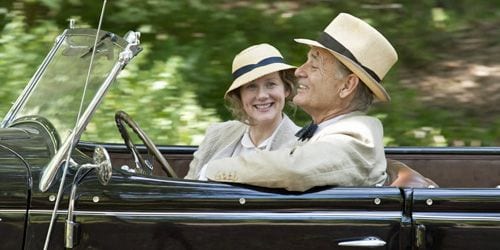
“This was years ago,” remembers Daisy (Laura Linney). “I couldn’t afford secrets. I just had chores.” And so you see her, framed by doorways and beigey light, looking aptly domestic and a little dreary. A few moments of this nostalgic look-back suffices to set up Daisy’s big day out, when she’s summoned by the president, her cousin, Franklin Roosevelt (Bill Murray). “I won’t be long,” she bids her aunt (Eleanor Bron) goodbye, heading for the car that’s been sent to fetch her. And with that, her life is changed.
So goes the mythic recall of Hyde Park on Hudson, a view of the president courtesy of Daisy. “I wasn’t the first relative his mother called that day,” she explains in voiceover, “But I was around. He needed someone to take his mind off his work.” Suitably distracting and undemanding, Daisy is thus engaged in what appears a routine seduction, one that begins with the president showing his stamp collection. As she stands near the door of his study, Franklin sits behind his desk and gestures: she must come closer, he says, in order to appreciate the color and the detail in the stamps. And yes, when she comes closer, and uses his magnifying glass, she sighs at the exquisite beauty before her.
And with that, it seems, Daisy is smitten. The film presumes you follow and even empathize with her feelings, for it spends precious little time indicating why Franklin is so enthralling. He suggests that he’s vulnerable, that “My cross is that I’m too nice.” Really, he sighs, “Why can’t politicians just be honest?” Sheesh, don’t we all wonder? And with that, he proceeds to lure Daisy into their very own deception. That’s not to say it’s entirely secret, as Franklin’s assistants make way for whatever the great man wants and it’s plain that Eleanor is fully aware of what goes on.
In fact, it’s Daisy who’s surprised to find that the secret is not secret. The movie presents it as something of a dry joke, the sex part, anyway. Their one time (on screen) begins as a drive: Franklin clenches his cigarette holder, pops his magnificent convertible into gear by way of the hand controls specially engineered for him, and plows up a hill and into a grand field full of wildflowers. Here he turns on the radio, leans back and smiles. The shot discreetly keeps outside the car, even begins to circle it from a distance, as you see their shoulders move, slightly: he places her hand on his crotch and she proceeds. It’s what you do, you know, when a man has beautiful stamps.
With this bit done, Hyde Park on Hudson moves on: King George (Samuel West) and Queen Elizabeth (Olivia Colman) arrive for a visit, and much like Daisy has been, they too will be seduced. The stakes for the meeting have to do with the imminent World War II, and the king seeks the president’s support in the turmoil that must follow. The tension, such as it is, concerns the uptight royals’ reactions to the president, so garrulous and carnal and in brash in a diplomatic sort of way. The Americans conjure a particular means of seeming to appeal to the Brits while simultaneously putting them in their stuffy, supercilious place, a picnic that features Native Americans performing (Eleanor’s idea) and hot dogs — which Elizabeth takes an affront, describing her upset to her husband with an imperious phrasing that mostly marks her as a fuddy-duddy.
At first, George — the king who stutters and isn’t entirely convinced he wants to be king — takes Elizabeth’s view: they whisper and worry in the upstairs bedroom assigned to them, with walls adorned with a set of colorful drawings that appear to mock British soldiers. But after the king spends an evening drinking with the president, it’s clear that her view is deemed not only irrelevant but also embarrassing. George goes on to cajole her, much as the Americans are wont to do, and in the antic picnic business that follows, you’re treated to the specter of a Lesson, namely, Photo Ops = Politics.
Even back in these beigey nostalgic times, that lesson looks old. What the film offers by way of news is the difference and the not so interesting dissonance between the worlds of men and women. For the former, Franklin embodies all. Charismatic and blustery, big and self-loving, he serves as a warm dad for George and an attraction for all the girls save Elizabeth. But those girls, numerous and prone to chatter, are left mostly to hover around the boys. You’ve heard stories about Eleanor’s great energy and wit, about the power she wielded in her own right, but none of that is in evidence here. Granted, it’s not her movie, but the focus on Daisy’s efforts to comprehend what she takes for greatness soon looks more quaint than persuasive.
That focus is uneven, too. Though Daisy narrates and provides an emotional way in, she can’t see or much know about the movie’s more involving scenes, the night of boy bonding or the royals’ whisperings. And as much as she comes to appreciate the seemingly unusual of her powerful lover, you might be less enchanted. He’s not so distinctive as he is ordinary, which might be a revelation in its own way.

![Call for Papers: All Things Reconsidered [MUSIC] May-August 2024](https://www.popmatters.com/wp-content/uploads/2024/04/all-things-reconsidered-call-music-may-2024-720x380.jpg)



